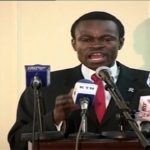Sudan President Omar Hassan Ahmad al-Bashir is once again in the news, for the wrong reasons. The man who has ruled Sudan for over two decades was indicted by the International Criminal Court (ICC) in The Hague for Genocide, war crimes and crimes against humanity in 2009, for his ruthless activities for over ten years that have led to the death of over 300.000 people in the restive Darfur region in the west of his country.
And now, in a bold move and show of the rule of law, early this week on Sunday a South African court had issued a temporary order, barring the Sudanese President from leaving the Rainbow State. Bashir, the first sitting President to be indicted, was in SA for the African Union Summit and the ICC immediately swung into action, demanding that he be arrested. South Africa is a party to ICC treaty and is bound by the rules to arrest any indictee who sets foot on its soil. But some African leaders and the Government of South Africa are arguing that indicted leaders cannot be arrested while attending the AU summit.
Indeed, a lot about the operations of the ICC has been said by some African presidents, with castigation that it only focuses on ‘unfairly’ arresting African leaders (and some African warlords). There is a degree of truth in that claim. But there is also reason to further interrogate their claim because, as it turns out, majority of the oppressive regimes and leaders are to be found in Africa. Also, it is important that these guys who run ruthless governments that torture and butcher citizens with impunity must be brought to book and punished.
This is not the first time Bashir is tempting the international community in regard to his warrant of arrest and his AU antics. In 2013 human rights lawyers in Nigeria sought his arrest as he was in the country to attend the AU summit. He fled!
But in a show of defiance, and in order to travel, the reclusive leader has since been hiding behind the cover of the AU, something that should not be allowed to gain currency. It is also time the ICC seeks amendments, and strengthens its rules of engagement with members of the Assembly of State Parties (ASP) and make changes, including sanctions, to its enforcement programme.






